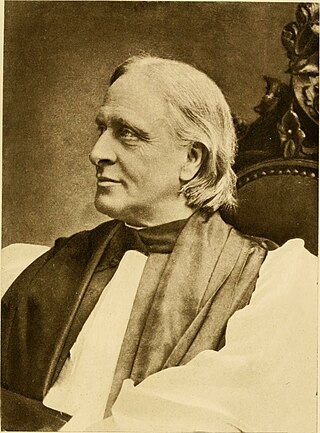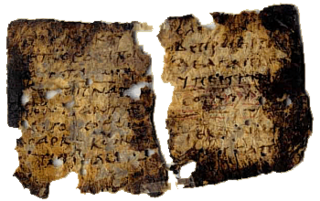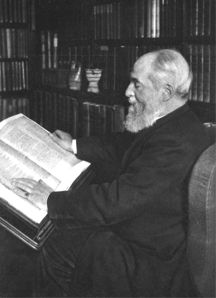Anglicanism is a Western Christian tradition which developed from the practices, liturgy, and identity of the Church of England following the English Reformation, in the context of the Protestant Reformation in Europe. It is one of the largest branches of Christianity, with around 110 million adherents worldwide as of 2001.

Anglo-Catholicism comprises beliefs and practices that emphasize the Catholic heritage and identity of the Church of England and various churches within the Anglican Communion. Anglo-Catholics are primarily concerned with restoring the liturgical and devotional expression of the Christian faith in the life of the Anglican Church.

Edward White Benson was archbishop of Canterbury from 1883 until his death. Before this, he was the first Bishop of Truro, serving from 1877 to 1883, and began construction of Truro Cathedral.

Mark Pattison was an English author and a Church of England priest. He served as Rector of Lincoln College, Oxford.

Brooke Foss Westcott was an English bishop, biblical scholar and theologian, serving as Bishop of Durham from 1890 until his death. He is perhaps most known for co-editing The New Testament in the Original Greek in 1881. He was an enthusiastic supporter of the British Empire.

John Frederick Denison Maurice was an English Anglican theologian, a prolific author, and one of the founders of Christian socialism. Since the Second World War, interest in Maurice has expanded.

In Christian denominations that practice infant baptism, confirmation is seen as the sealing of the covenant created in baptism. Those being confirmed are known as confirmands. For adults, it is an affirmation of belief. The ceremony typically involves laying on of hands.

A catechism is a summary or exposition of doctrine and serves as a learning introduction to the Sacraments traditionally used in catechesis, or Christian religious teaching of children and adult converts. Catechisms are doctrinal manuals – often in the form of questions followed by answers to be memorised – a format that has been used in non-religious or secular contexts as well. According to Norman DeWitt, the early Christians appropriated this practice from the Epicureans, a school whose founder Epicurus had instructed to keep summaries of the teachings for easy learning. The term catechumen refers to the designated recipient of the catechetical work or instruction. In the Catholic Church, catechumens are those who are preparing to receive the Sacrament of Baptism. Traditionally, they would be placed separately during Holy Mass from those who had been baptized, and would be dismissed from the liturgical assembly before the Profession of Faith and General Intercessions.

John Eliot was a Puritan missionary to the American Indians who some called "the apostle to the Indians" and the founder of Roxbury Latin School in the Massachusetts Bay Colony in 1645. In 1660 he completed the enormous task of translating the Eliot Indian Bible into the Massachusett Indian language, producing more than two thousand completed copies.

The Didache, also known as The Lord's Teaching Through the Twelve Apostles to the Nations, is a brief anonymous early Christian treatise written in Koine Greek, dated by modern scholars to the first or second century AD.
The Boyle Lectures are named after Robert Boyle, a prominent natural philosopher of the 17th century and son of Richard Boyle, 1st Earl of Cork. Under the terms of his Will, Robert Boyle endowed a series of lectures or sermons which were to consider the relationship between Christianity and the new natural philosophy then emerging in European society. Since 2004, this prestigious Lectures series has been organized, with the assistance of Board of the Boyle Lectures, by the International Society for Science and Religion (ISSR) and has been held at one of its original locations, the Wren church of St Mary-le-Bow on Cheapside in the City of London.

Sir Frederick Pollock, 3rd Baronet PC, FBA was an English jurist best known for his History of English Law before the Time of Edward I, written with F.W. Maitland, and his lifelong correspondence with US Supreme Court Justice Oliver Wendell Holmes. He was a member of the Cambridge Apostles.
In keeping with its prevailing self-identity as a via media or "middle path" of Western Christianity, Anglican sacramental theology expresses elements in keeping with its status as a church in the catholic tradition and a church of the Reformation. With respect to sacramental theology the Catholic tradition is perhaps most strongly asserted in the importance Anglicanism places on the sacraments as a means of grace, sanctification and forgiveness as expressed in the church's liturgy.
Anglican doctrine is the body of Christian teachings used to guide the religious and moral practices of Anglicanism.

Handley Carr Glyn Moule was an evangelical Anglican theologian, writer, poet, and Bishop of Durham from 1901 to 1920.

Henry Barclay Swete was an English biblical scholar. He became Regius Professor of Divinity at Cambridge in 1890. He is known for his 1906 commentary on the Book of Revelation, and other works of exegesis.
Frederick George Lee was a priest of the Church of England and a religious author. He co-founded the Order of Corporate Reunion.

Christianity in the ante-Nicene period was the time in Christian history up to the First Council of Nicaea. This article covers the period following the Apostolic Age of the first century, c. 100 AD, to Nicaea in 325 AD.

Samuel Martin Bailey Wells is an English priest of the Church of England. Since 2012, he has been the vicar of St Martin-in-the-Fields in central London, and Visiting Professor of Christian Ethics at King's College London. In 2018, he was installed as Honorary Canon Theologian of Guildford Cathedral.
William Edward Scudamore (1813-1881) was a prominent Church of England priest, historian, liturgist, chaplain, and devotional author. His popular devotional manual Steps to the Altar reached its sixty-seventh edition in 1887, and was used extensively in North America and on the Indian subcontinent in addition to in Great Britain.














